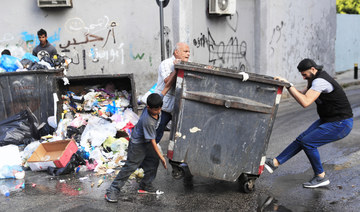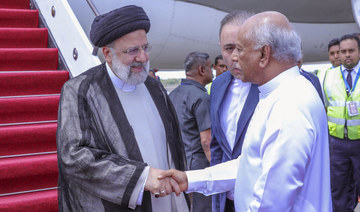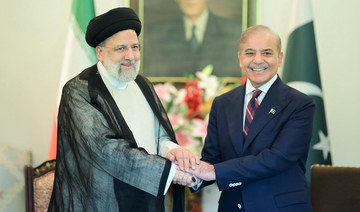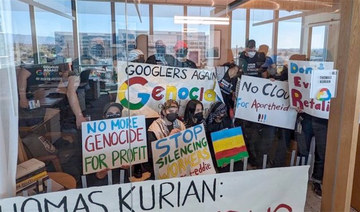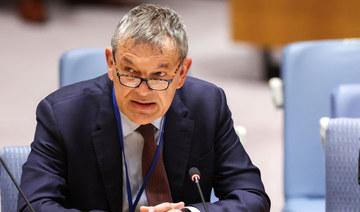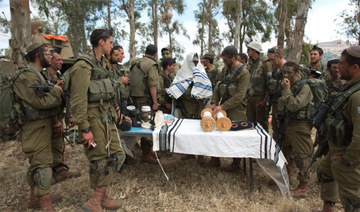PARIS/BRUSSELS: Criteria for European Union sanctions being prepared for Lebanese politicians are likely to be corruption, obstructing efforts to form a government, financial mishandling and human rights abuses, according to a diplomatic note seen by Reuters.
Led by France, the EU is seeking to ramp up pressure on Lebanon’s squabbling politicians after 11 months of a crisis that has left Lebanon facing financial collapse, hyperinflation, electricity blackouts, and fuel and food shortages.
The bloc, which has been holding technical discussions on possible measures for the last month, has yet to decide on which approach to take, but foreign policy chief Josep Borrell is due in Lebanon this weekend and will report back to foreign ministers on Monday.
As many senior Lebanese politicians have homes, bank accounts and investments in the EU, and send their children to universities there, a withdrawal of that access could help focus minds.
Paris says it has already taken measures to restrict entry for some Lebanese officials it sees as blocking efforts to tackle the crisis, which is rooted in decades of state corruption and debt, although it has not named anybody publicly.
The EU first needs to set up a sanctions regime that could then see individuals hit by travel bans and asset freezes, although it may also decide to not list anybody immediately.
The note, which also outlines the strengths and weaknesses of taking such a measure, focuses on four criteria. It begins with obstructing the establishment of a government, the political process or the successful completion of the political transition and then turns to obstructing the implementation of urgent reforms needed to overcome the political, economic and social crisis.
Financial mishandling, which would target people, entities or bodies believed to be responsible for the mismanagement of public finances and the banking sector, is also a core criteria as is the violation of human rights as a result of the economic and social crisis.
“It might be argued that the lack of political responsibility of the leadership in Lebanon is at the core of a massive implosion of the economy,” the note reads, referring to the possible human rights criteria.
“This has led to significant suffering and has affected the human rights of the population in Lebanon.”
Such diplomatic notes are common in EU policymaking, circulated among EU diplomats and officials, although they are not made public.
The note also says an “exit strategy” proposing benchmarks for establishing whether the sanctions regime has served its purpose as well as for renewing or lifting individual designations should also be put in place.
How quickly sanctions could be imposed is still unclear, but with political divisions continuing to worsen, the bloc is likely to press ahead before the summer holiday period.
There are divisions among the 27 EU states over the wisdom of EU sanctions, but the bloc’s two main powers, France and Germany are in favor, which is likely to prove pivotal. A larger group of nations has yet to specify their approach.
Hungary has publicly denounced EU efforts to pressure Lebanese politicians.
A senior European official told Reuters Paris had set its sights on sanctioning powerful Christian politician Gebran Bassil, who is already under US sanctions.
EU sets out potential criteria for Lebanese sanctions — document
https://arab.news/nahu3
EU sets out potential criteria for Lebanese sanctions — document
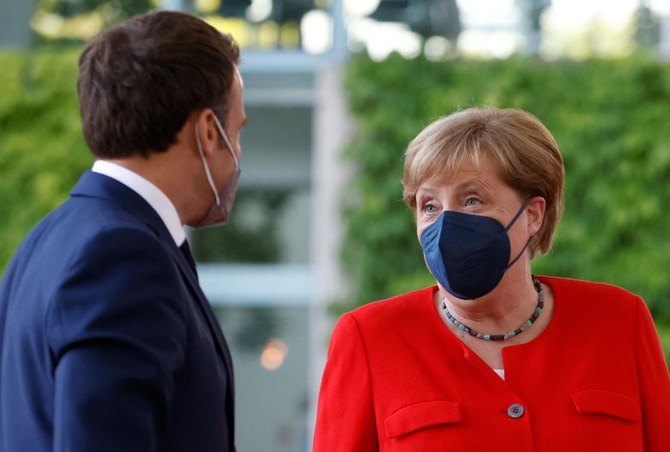
- Led by France, the EU is seeking to ramp up pressure on Lebanon's squabbling politicians
- Senior European official told Reuters Paris had set its sights on sanctioning powerful Christian politician Gebran Bassil
Iran, Pakistan urge UN Security Council to take action against Israel
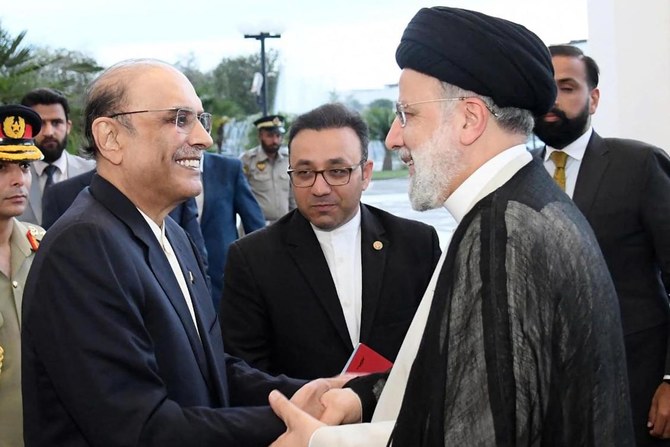
- The joint statement followed a three-day visit to the country by Iranian President Ebrahim Raisi
- Muslim neighbors Iran and Pakistan are seeking to mend ties after unprecedented tit-for-tat military strikes this year
ISLAMABAD: Iran and Pakistan called on the United Nations Security Council in a joint statement issued on Wednesday to take action against Israel, saying it had “illegally” targeted neighboring countries and foreign diplomatic facilities.
The joint statement, released by Pakistan’s foreign ministry, followed a three-day visit to the country by Iranian President Ebrahim Raisi at a time of heightened tensions in the Middle East.
Explosions were heard last Friday over the Iranian city of Isfahan in what sources said was an Israeli attack. However, Tehran played down the incident and said it had no plans for retaliation.
“Recognizing that the irresponsible act of the Israeli regime forces was a major escalation in an already volatile region, both sides called on the UN Security Council to prevent the Israeli regime from its adventurism in the region and its illegal acts attacking its neighbors...,” Iran and Pakistan said in their joint statement.
Muslim neighbors Iran and Pakistan are seeking to mend ties after unprecedented tit-for-tat military strikes this year.
Raisi, who wrapped up his visit and flew on to Sri Lanka on Wednesday, vowed to boost trade between Iran and Pakistan to $10 billion a year.
During his visit to Pakistan, Raisi was quoted by Iran’s official IRNA news agency as saying any further Israeli attack on Iranian territory
could radically change the dynamics and result in there being nothing left of the “Zionist regime.”
On April 13, Tehran launched a barrage of missiles and drones at Israel in what it said was retaliation for Israel’s suspected deadly strike on the Iranian embassy compound in Damascus on April 1, but almost all were shot down.
Pakistan has previously called for de-escalation by “all parties.”
Iran and Pakistan vowed during Raisi’s visit to boost trade and energy cooperation, including on a major gas pipeline deal that has faced delays due to geopolitical issues and international sanctions.
Lebanon’s Hezbollah says fired ‘dozens’ of rockets at Israel
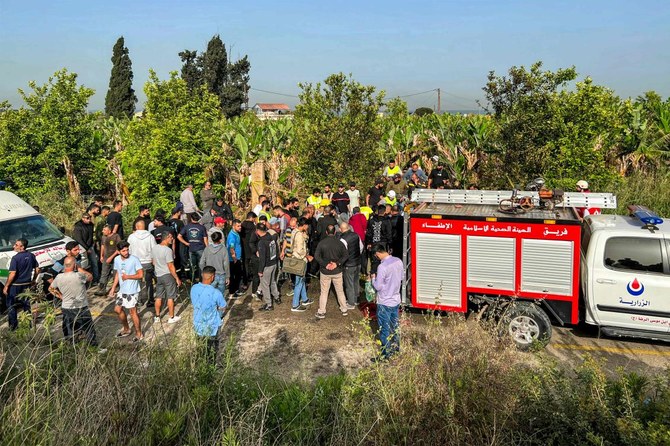
- Hezbollah has exchanged near-daily fire with the Israeli army
- Israel says 11 soldiers and eight civilians have been killed on its side of the border
Beirut: Lebanon’s Iran-backed Hezbollah movement said it fired a fresh barrage of rockets across the border on Wednesday after a strike blamed on Israel killed two civilians.
The group had already fired rockets at northern Israel late on Tuesday “in response” to the civilian deaths.
Hezbollah has exchanged near-daily fire with the Israeli army since its ally Hamas carried out an unprecedented attack on Israel on October 7, triggering war in Gaza.
It has stepped up its rocket fire on Israeli military bases in recent days.
Hezbollah fighters fired “dozens of Katyusha rockets” at a border village in northern Israel “as part of the response to the Israeli enemy’s attacks on... civilian homes,” the group said in a statement.
On Tuesday, rescue teams said an Israeli strike on a house in the southern village of Hanin killed a woman in her fifties and a girl from the same family.
Since October 7, at least 380 people have been killed in Lebanon, mostly Hezbollah fighters but also 72 civilians, according to an AFP tally.
Israel says 11 soldiers and eight civilians have been killed on its side of the border.
Germany to resume cooperation with Palestinian UNRWA agency
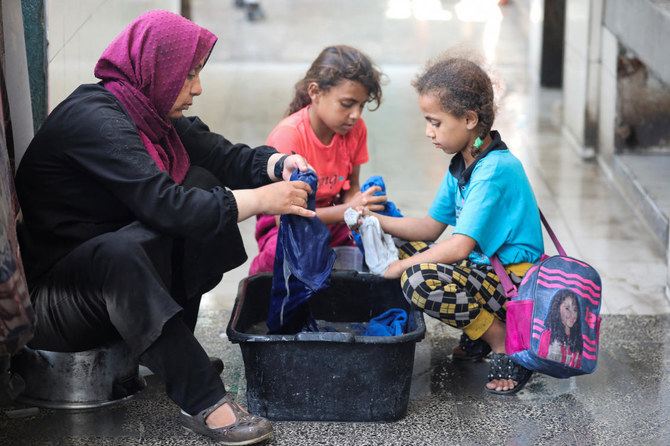
BERLIN: The German government plans to resume cooperation with the UN agency for Palestinians (UNRWA) in Gaza, the foreign and development ministries said in a joint statement on Wednesday.
The decision follows an investigation by the former French foreign minister Catherine Colonna into whether some UNRWA employees were involved in the Oct. 7 attack by Hamas.
The Colonna-led review of the agency’s neutrality on Monday concluded Israel had yet to back up its accusations that hundreds of UNRWA staff were operatives in Gaza terrorist groups.
The German ministries urged UNRWA to swiftly implement the report’s recommendations, including strengthening its internal audit function and improving external oversight of project management.
“In support of these reforms, the German government will soon continue its cooperation with UNRWA in Gaza, as Australia, Canada, Sweden and Japan, among others, have already done,” said the ministries in the statement.
Rafah evacuations not ‘possible’ under current conditions: Red Cross
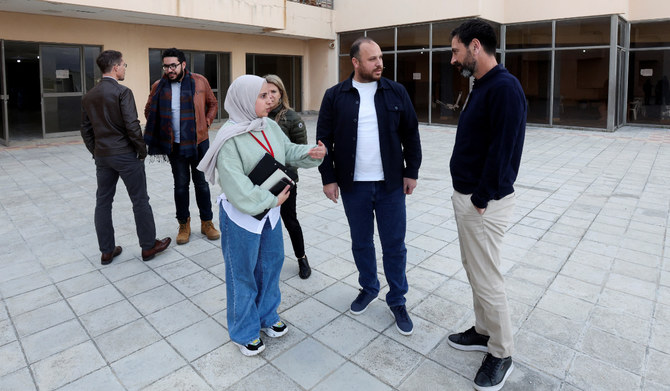
- Israel has killed at least 34,183 people in Gaza, mostly women and children, according to Gaza health ministry
- Israeli media predict offensive in Gaza’s Rafah soon
DUBAI: Humanitarian workers have no knowledge of plans to evacuate Palestinians from Gaza’s southernmost city ahead of an expected Israeli assault, but such a transfer would not be “possible” under current conditions, a Red Cross official told AFP on Tuesday.
“The rumor is that the probability of a major operation in Rafah is increasing,” Fabrizio Carboni, Middle East regional director for the International Committee of the Red Cross (ICRC), said on the sidelines of an aid conference in the United Arab Emirates.
“When we see the level of destruction in the middle area (of Gaza) and in the north, it’s not clear to us where people will be moved to... where they can have decent shelter and essential services,” he added.
“So today, with the information we have and from where we stand, we don’t see this (massive evacuation) as possible.”
Israel is poised to send troops into Rafah, the Gazan city it sees as the last bastion of Hamas, Israeli media reported on Wednesday, saying preparations were under way to evacuate war-displaced Palestinian civilians who have been sheltering there.
The Rafah sweep, postponed for several weeks amid disputes with Washington, will happen “very soon,” the mass-circulation Israel Hayom newspaper said, citing a decision by the Israeli government after ceasefire talks with Hamas stalled.
Several other Israeli media outlets carried similar reports. Some noted footage on social media that appeared to show the erection of a tent city for Rafah evacuees.
Prime Minister Benjamin Netanyahu’s office and the Israeli military spokesperson’s office had no immediate comment.
More than 1.5 million of Gaza’s population of 2.4 million had sheltered in Rafah, the last major population center in Gaza that Israeli ground troops have yet to enter, though thousands have been seen heading back north.
Israeli Prime Minister Benjamin Netanyahu has for two months talked of sending troops into Rafah to go after Hamas, the Palestinian militant group that runs Gaza.
On Sunday, he said the Israeli military would increase pressure to “deliver additional and painful blows” to the group behind the October 7 attack on Israel which triggered the ongoing war.
But Israel’s allies including Washington have warned against a Rafah operation, fearing a worsening of Gaza’s already catastrophic humanitarian conditions.
“We don’t see for the time being any plans for civilian evacuations,” Carboni said during the interview on Tuesday at the Dubai International Humanitarian Aid and Development Conference (DIHAD).
But “there is no condition for a military operation without devastating humanitarian consequences,” he added.
“Considering the level of destruction, considering that people are tired, some of them wounded and sick, and the limited access to food and essential services, I see (evacuations) as extremely challenging.”
The Israeli government said it was planning different evacuation scenarios, including the creation of tent cities that would be spared the fighting and would be set up with international support.
Citing Egyptian officials briefed on the Israeli plan, the Wall Street Journal reported that the evacuation operation would last two to three weeks and be carried out in coordination with the United States and Arab countries, including the UAE as well as Egypt.
But Carboni said an evacuation would be “difficult” to complete in that time frame.
Also speaking to AFP at DIHAD on Tuesday, the head of the Norwegian Refugee Council (NRC) said that “everybody seems to be on a countdown to war across the largest displacement camp on earth, which is Rafah.”
Describing a Rafah onslaught as an “apocalyptic situation,” Jan Egeland said aid workers operating inside Gaza have not been briefed on plans to mitigate civilian suffering during a Rafah offensive.
“There is no information, no consultation with the humanitarians, no advice, no hope,” he said.
Humanitarians in Gaza are “not hearing from the donors. They’re not hearing from the Western sponsors of Israel, and nothing from Israel itself,” Egeland said.
“What they hear is that Netanyahu says that he will attack but not plans for where should the civilians go, how can aid be provided or how can access be secured.
“We are completely in the dark on how to mitigate this countdown to a catastrophe.”
The little aid that is entering Gaza is being distributed in real time leaving no buffer stock that could be used in the event of a massive population movement, Egeland said.
“There is no stocks, there is no fuel and more importantly, there is no liquidity. There is no money, we cannot pay our staff salaries. We cannot pay those who deliver the services,” the NRC chief added.
Egeland said some Palestinians had returned to areas in northern Gaza in recent weeks but that more than one million remained in Rafah.
For those who have left “what awaits them in the north is ruins, complete ruins and unexploded ordinance and, in many cases, more bombardment,” he said.
“There is no safe place in Gaza if people leave Rafah.”
The Gaza war began with the unprecedented Hamas attack on Israel on October 7 that resulted in the deaths of 1,170 people, mostly civilians, according to an AFP tally of Israeli official figures.
Israel’s retaliatory offensive has killed at least 34,183 people in Gaza, mostly women and children, according to the Hamas-run territory’s health ministry.



